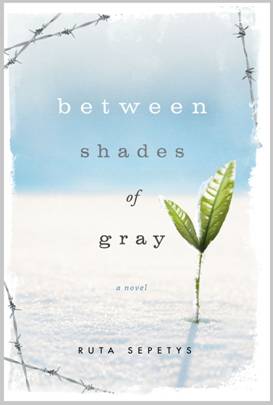
THE VOICE OF INTERNATIONAL LITHUANIA
|
VilNews has its own Google archive! Type a word in the above search box to find any article.
You can also follow us on Facebook. We have two different pages. Click to open and join.
|
Best-selling author Ruta Sepetys interviewed by Ellen Cassedy

Ruta Sepetys’ novel “Between shades of Gray” tells the story of the Soviet deportations of 1941. More at www.betweenshadesofgray.com
June 14 marks the 70th anniversary of mass deportation of Lithuanians to Siberia. On this date in 1941, as Nazi Germany prepared to invade Lithuania, Soviet authorities loaded tens of thousands of people – men, women and children – into cattle cars and transported them into exile. Some were sentenced to death; some died under harsh conditions of forced labor; some survived. With Stalin’s death in 1953, the Siberian camps began to empty out. But it was many years before the stories of the exile were openly told.

Author Ruta Sepetys
A new novel, Between Shades of Gray (Philomel/Penguin), brings the story of the 1941 deportations into vivid focus. It will be published in Lithuania under the name Tarp pilku debesu (Alma Littera), and in 23 other countries.
VilNews correspondent Ellen Cassedy interviewed author Ruta Sepetys Washington, D.C.
Growing up in America as the daughter of a Lithuanian refugee, you didn’t know that members of your own extended family were among the deported. How did you find out?
I visited Lithuania several years ago and met with some family members for the first time. They told me that after my grandfather left Lithuania in 1940 with his wife and son (my father), officials came looking for him. When they couldn’t find him, they deported other members of the family.
And once you learned what had happened…
I became passionate about telling the story. I went back to Lithuania and met with survivors, psychologists, historians, and government officials. Everyone I met had a connection to Siberia.
As a member of the second generation after the deportations, did you feel you had a special role to play?
Yes. I asked questions that the previous generation might find inappropriate. I wanted to get at the truth. I wanted to know.
Were these events difficult for people to talk about?
Sometimes, yes. At first I thought I would write the story as non-fiction, but people’s hands were trembling as they talked to me. “You can’t use my name,” they said. They wanted to talk, but not on the record. I wanted the story to be personal. I wanted characters that readers could root for, cry for. So I created Lina, the 15-year-old heroine of the book.
As the book opens, Lina is a lively teenage girl looking forward to summer vacation. Then the secret police arrive to take her and her mother and brother to Siberia. Lina’s efforts to survive in both body and soul make for a harrowing tale, but also, I found, an uplifting one.
What struck you about the survivors you met?
Their capacity for forgiveness. It seemed that those who suffered the worst found the most forgiveness. It was such a gift to meet with these people.
What does the title mean?
Over and over, survivors told me that what they went through was complex, not black and white. Not all of the NKVD officers were bad, for example. Some helped the prisoners with small acts of kindness, which made them feel human again and gave them strength.
Your book is winning great acclaim. You’re making two European tours. Why do you think people are open to hearing this story now, when in the past they might not have been?
People gravitate toward stories about the human spirit, about characters who are beautiful in their imperfection. Maybe people find something of themselves in these characters.
I hope we can use this story to study a tragic part of history and create more protection for the Baltics. Examining history creates hope for a more just future.
My own Jewish family suffered from the crimes of the Nazi era in Lithuania. How do you think the two eras should be examined today?
I think the crimes of Hitler and the crimes of Stalin should be studied and acknowledged separately, but I hope people will be open to conversations where both parts of history are examined and discussed respectfully. I hope we can celebrate our braveries and console our regrets together.
Last words?
For many years, Lithuania tried to get this story out there in the world, but our story was lost.
I wrote the book, but it’s not my story. The story belongs to Lithuania and the Baltics. I’m honored to tell it.
Read more about Between Shades of Gray at www.betweenshadesofgray.com.
 |
Ellen Cassedy |
- Bookmark :
- Digg
- del.icio.us
- Stumbleupon
- Redit it
VilNews e-magazine is published in Vilnius, Lithuania. Editor-in-Chief: Mr. Aage Myhre. Inquires to the editors: editor@VilNews.com.
Code of Ethics: See Section 2 – about VilNews. VilNews is not responsible for content on external links/web pages.
HOW TO ADVERTISE IN VILNEWS.
All content is copyrighted © 2011. UAB ‘VilNews’.

 Click on the buttons to open and read each of VilNews' 18 sub-sections
Click on the buttons to open and read each of VilNews' 18 sub-sections 



[…] more 1… Read more 2… Read more 3… Read more 4… Read more 5… Read more 6… Read more 7… Read more […]
I may only be an 8th grader but this book was amazing i read it in one day. I could not put it down. Ruta is an amazing author and has many beautifully written stories. I picked up this book in a book store looked at the price and stood in line reading it when i got to the counter i gave him full cash and walked out still reading. I staid up all night to finishing it and im going to read it again, but although i have already read it its so amazing i thought i might read it over. So i took it out my purse and read the first page next thing i new i was like i havnt alread read it. Thank you so much for you book it really inspired me on my writing and maid me think more of other people more than myself, i am very greatfull this was written and I wish more young children as me will take the time and read this beautiful book between shades of gray.
I read this book in one day…could not put it down. What an amazing story of bravery and strength.
[…] https://vilnews.com/?p=6580 […]